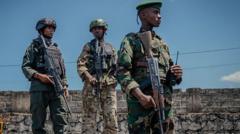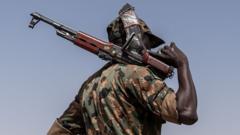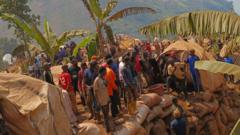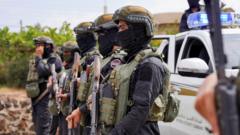Rwanda's exit from the Eccas follows allegations of its support for M23 rebels in eastern Democratic Republic of Congo, reflecting deepening geopolitical rifts in Central Africa.
Rwanda Exits Economic Bloc Amid Tensions Over DR Congo Involvement

Rwanda Exits Economic Bloc Amid Tensions Over DR Congo Involvement
Rwanda's withdrawal from the Economic Community of Central African States raises new questions about regional stability and cooperation.
Rwanda has announced its decision to withdraw from the Economic Community of Central African States (Eccas) in light of ongoing diplomatic tensions related to its alleged involvement in the conflict in eastern Democratic Republic of Congo (DRC). The country was expected to take over the chairmanship of the bloc during a recent summit held in Equatorial Guinea but was denied this opportunity.
Rwanda expressed its frustration, claiming that its right to chair the organization was overlooked as a means to enforce what it termed a "diktat" from DRC. The Rwandan government suggested that it could not justify remaining in an organization that it feels has strayed from its foundational principles and objectives.
This move comes amid ongoing efforts to negotiate a peace plan for the conflict in eastern DRC, where Rwanda has been accused of supporting the M23 rebel group. The conflict has escalated recently, with M23 seizing control of key cities such as Goma and Bukavu. Statements from the Congolese government accused Rwanda of aggression and called for the withdrawal of any Rwandan troops allegedly stationed in DRC.
At the summit, Eccas leaders reportedly recognized the aggression towards DRC and decided that Equatorial Guinea would continue as chair as a result of Rwanda’s perceived violations of regional norms. Congolese spokesperson Patrick Muyaya asserted that Rwanda must reconsider its approach to regional cooperation.
Accusations against Rwanda date back to a UN report from the previous year, which purported that thousands of Rwandan troops were engaging with M23 rebels directly. However, Rwanda has consistently denied these claims, stating that its military presence is strictly defensive, aimed at safeguarding its borders from spillover violence.
Rwanda's history with Eccas is notable, as it previously withdrew from the bloc in 2007, only to rejoin later. The current scenario raises significant questions about the future of regional unity and cooperation in Central Africa as the situation in DRC continues to unfold.
Additional reporting has been sourced from various news outlets covering the tensions in Central Africa.





















